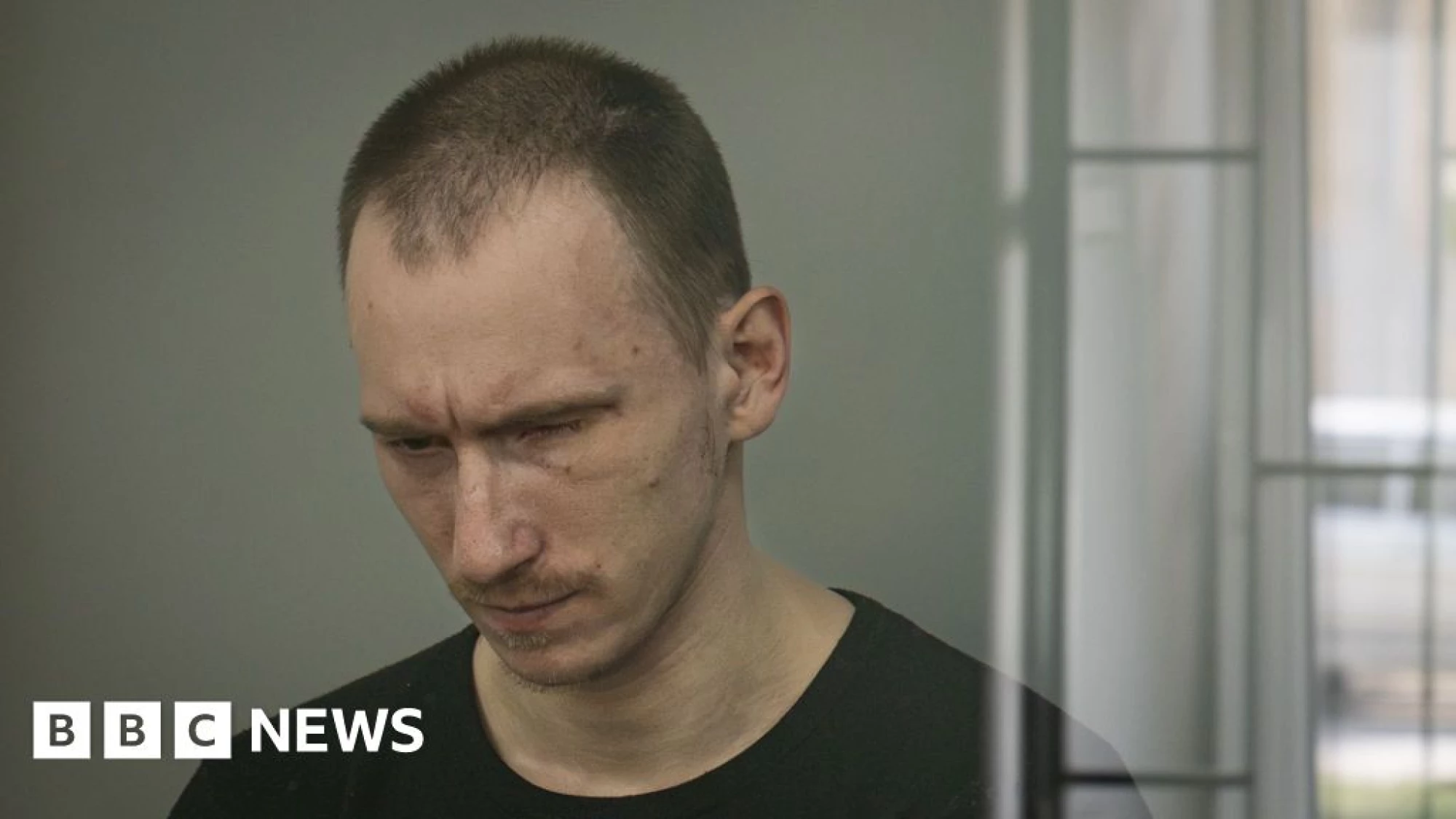Ukraine war crime trial: A Russian soldier takes the stand for an execution

Dmitriy Kurashov is the first Russian soldier to stand trial in Ukraine over a battlefield execution.
Watch LiveBritish Broadcasting CorporationHomeNewsSportBusinessInnovationCultureArtsTravelEarthAudioVideoLiveHomeNewsIsrael-Gaza WarWar in UkraineUS & CanadaUKUK PoliticsEnglandN. IrelandN. Ireland PoliticsScotlandScotland PoliticsWalesWales PoliticsAfricaAsiaChinaIndiaAustraliaEuropeLatin AmericaMiddle EastIn PicturesBBC InDepthBBC VerifySportBusinessExecutive LoungeTechnology of BusinessFuture of BusinessInnovationTechnologyScience & HealthArtificial IntelligenceAI v the MindCultureFilm & TVMusicArt & DesignStyleBooksEntertainment NewsArtsArts in MotionTravelDestinationsAfricaAntarcticaAsiaAustralia and PacificCaribbean & BermudaCentral AmericaEuropeMiddle EastNorth AmericaSouth AmericaWorld’s TableCulture & ExperiencesAdventuresThe SpeciaListEarthNatural WondersWeather & ScienceClimate SolutionsSustainable BusinessGreen LivingAudioPodcastsRadioAudio FAQsVideoLiveLive NewsLive SportHomeNewsSportBusinessInnovationCultureArtsTravelEarthAudioVideoLiveWeatherNewslettersWatch LiveThe first trial of its kind: A Russian soldier takes the stand for an execution2 days agoShareSaveJoel GunterReporting from Zaporizhzhia, UkraineShareSaveBBCDmitriy Kurashov is the first Russian soldier to stand trial in Ukraine for an alleged battlefield executionOn the frozen frontline in the east of Zaporizhzhia, a Ukrainian soldier surveyed the fallout from a Russian assault. It was the middle of January 2024 and the ground was covered in ice. Two weeks earlier, an 18-strong Russian assault team had broken through the line and seized three positions, killing five Ukrainians and losing 10 Russians before ceding the thin stretch of land back to the Ukrainians just hours later. The three positions that had changed hands were each just a few foxholes in the ground – dots on a devastated landscape of craters and shredded trees.
The Ukrainian soldier filmed as he looked over the remains of his fallen comrades. "This is Vitas, the small one," he said, using the dead man's callsign. He examined another body. "A silver ring, this is Grinch," he said. With difficulty, he turned over another frozen body. It was in bad condition, but the face was recognisable. The soldier sighed. "What can I find to cover you, so that you won't get cold," he said to the dead man. He picked up a nearby helmet and placed it over the damaged face. "We have found the Penguin," he said.
A year later, in January 2025, a Russian soldier was frog-marched down the corridor of a rundown local courthouse in Zaporizhzhia flanked by five Ukrainian soldiers and a large rottweiler trained on the Russian's scent and straining at its leash to attack him. Dmitriy Kurashov, callsign 'Stalker', was about to go on trial for the alleged battlefield execution of Vitalii Hodniuk, a veteran 41-year-old Ukrainian soldier known by the callsign 'Penguin'.
The trial was to be the first of its kind. According to Ukrainian authorities, Russian troops have executed at least 124 prisoners of war on the battlefield since the full-scale invasion began, but Kurashov is the first person to be brought to trial in Ukraine for the crime. His case is one of a tiny number among the tens of thousands of open war crimes cases where a suspect has been captured and can be made to stand in the dock. Adding to the unprecedented nature of the event, three members of Kurashov's own unit had agreed to testify against him.
In the bright, boxy courtroom, Kurashov was locked in a glass-enclosed dock. Short in stature, his head often bowed, he cut a subdued figure. When he did look around, he was forced to swivel his head because he had lost one eye to a grenade at the front. It was not Kurashov's first time in the dock; he had been jailed twice before in Russia, and was among the thousands of prisoners freed by the state to take part in the war.
https://www.bbc.com/news/articles/cp8ylx534j0o
Rating: 5